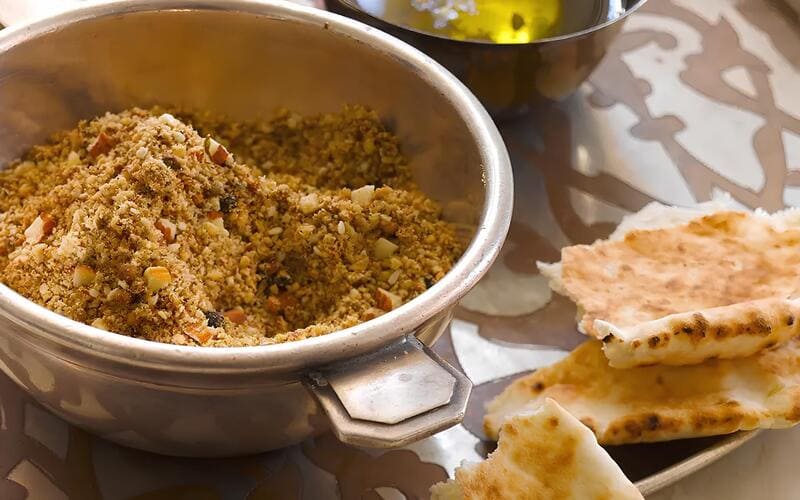
Dukkah has ancient roots in Egyptian cuisine, originating from a time when blending and roasting seeds and nuts were essential for creating versatile seasonings. This spice mix not only highlights Middle Eastern aromatic flavors but also serves as a favorite accompaniment to bread and olive oil, adding a special touch to any meal.
In Egypt, this authentic blend, known for its simplicity and easy preparation, brings together seasoning traditions rich in history. Each ingredient is roasted to perfection, creating a unique balance of textures and flavors that marry the best of what Egyptian and Lebanese cuisines have to offer.
Ingredients
- 1/2 cup hazelnuts
- 2 tbsp sesame seeds
- 1 tbsp coriander seeds
- 1 tbsp cumin seeds
- 1 tsp black peppercorns
- 1 tsp fennel seeds
- 1 tsp salt
Preparation
- Preheat your oven to 350°F (175°C). Spread the hazelnuts on a baking sheet and roast for 10 minutes until they are golden brown and fragrant.
- Remove the hazelnuts from the oven, let them cool, and then rub them with a cloth to remove most of the skins.
- In a dry skillet, toast the sesame seeds over medium heat until golden brown. Set them aside.
- Using the same skillet, toast the coriander seeds, cumin seeds, and black peppercorns until they are aromatic, about 3 minutes.
- Transfer the toasted spices and seeds to a mortar and pestle or a spice grinder, along with the fennel seeds. Grind them until they are coarsely ground.
- Coarsely chop the hazelnuts and mix them with the ground spices and salt.
- Store the dukkah in an airtight container for up to a month. Use it as a seasoning or enjoy it with bread dipped in olive oil.
Did you know?
Dukkah’s origins date back to ancient Egypt, where it was initially a practical food item for travelers and laborers because of its portability and nutritional value. Beyond its traditional use, dukkah has become popular worldwide as a versatile spice mix. In modern culinary practices, dukkah is not just a dip for bread; it enhances the texture and flavor of roasted vegetables, grilled meats, and even salads.
This Middle Eastern blend has various versions across the region, with each bringing a unique twist depending on local ingredients. For instance, Lebanese variations might include sumac for a tangier flavor. The name “dukkah” comes from the Arabic word “to pound” or “to crush,” referring to the traditional preparation method of pounding the mixture with a mortar and pestle.
Experimenting with dukkah opens up endless culinary possibilities. Sprinkle it over hummus for an added crunch, mix it into yogurt for a nutty, savory dip, or even use it as a crust for lamb or chicken. This artisan blend truly brings out the vibrant and authentic tastes of Egyptian cuisine, making it a cherished part of any pantry.
